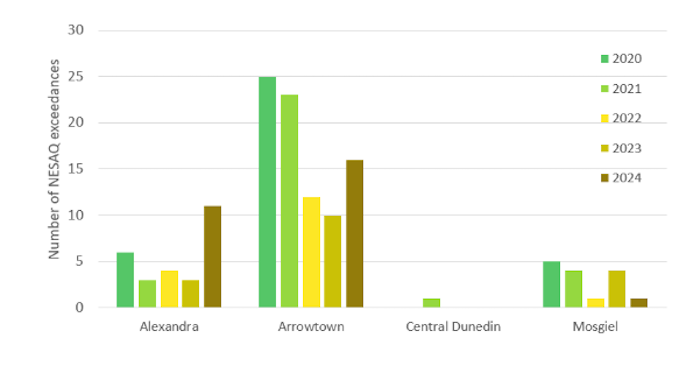Alexandra and Clyde still producing poor air quality over winter
Aimee Wilson
01 June 2025, 6:00 PM
 The smog that sits in the Alexandra basin during winter. Photo: The Central App
The smog that sits in the Alexandra basin during winter. Photo: The Central AppAlexandra produced significantly more National Environmental Standard air quality exceedances in 2024 than in previous years.
The Otago Regional Council released results of the State of the Environment (SOE) monitoring last week, with 28 exceedances of PM10 during the winter months in 2024, compared
with just 17 2023.
Sarah Harrison, Scientist – Air Quality said in her report that the main source of ‘particulate matter’ (PM) was home heating emissions over winter.
Long term exposure to PM2.5 and PM10 contributed to the risks of cardiovascular and respiratory conditions. In Otago, a lot of PM2.5 came from burning wood for home heating.
The national limit for PM10 was 50 µg/m³ for a 24-hour average, and Alexandra and Arrowtown recorded 11 and 16 exceedances, respectively.

PM10 was monitored continuously at four sites across the region in 2024: Alexandra, Arrowtown, Mosgiel and Central Dunedin.
The highest annual mean occurred at the Alexandra site with 16 µg/m³ - an exceedance of the World Health Organisation guideline (15 µg/m³).
The highest daily concentration was also recorded at Alexandra - 88 µg/m³ on July 27, 2024.
The SOE network was currently being upgraded to include monitoring for PM2.5 as well as expanded to add new sites including a new mobile site.
During 2024, PM2.5 was monitored in Arrowtown, Central Dunedin, Clyde, Cromwell, Milton, Mosgiel and Wānaka.
The sites with the highest annual averages were Clyde and Mosgiel, both with 13 µg/m³. The site with the highest 24-hour average was Milton, with 97 µg/³ on June 23, 2024.
An eighth site was also set up in Frankton towards the end of the year.
The highest annual mean occurred in Clyde and Milton, each with concentrations of 13 µg/m³; The highest winter mean for 2024, 31 µg/m³, was recorded at the Clyde site.
Milton and Clyde both had the highest daily concentration of 97 µg/m³ and 93 µg/m³ respectively.



